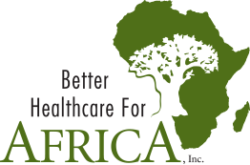Congratulations to Dr. Lowell Schnipper who who has obtained a three-year grant of $25,000 per year from the Sartia Kenedy East Foundation to support a cervical cancer prevention program at St. Albert’s Mission Hospitals for 2014-2016. Dr. Schnipper is the Theodore and Evelyn Berenson Professor of Medicine at Harvard Medical School. BHA helped develop the grant proposal and it administers the funds.
Cervical Cancer Prevention
As of 31 December 2014, the St. Albert’s cervical cancer prevention program screened 2,942 women. Of these, 114 were VIAC positive (that is, the cervix showed possible precancerous changes that should be treated), 34 had possible cancer and 22% were HIV positive. The program began 1 Aug. 2013.
The screening examination also identified many noncancerous, treatable conditions such as cervicitis, cysts, genital warts and other conditions. In this way, the cervical screening program helped the hospital improve maternal health.
BHA provided funds for the hospital to hire two contract nurses for VIAC clinic.
Meeting critical needs
- BHA provided a box of 219 sutures obtained from Global Links
- Provided $2,000 for the clearance through customs of a container with drugs provide to St Albert’s by the German Catholic NGO Medeor.
- Provided $2,000 for the clearance through customs of a container with powered milk and electronic supplies from Italy

The ten bags of powdered milk will go a long way providing a nutritious cup of milk to the patients we thank you.
BHA provided funds to clear a container destined for St. Albert’s but held up in customs so they could reach the hospital.




Visiting doctors
Coordinate visits to St Albert’s by two docs from Children’s Hospital in Columbus
Visit to Zimbabwe (Oct. 29 to Nov. 7)
We had several meetings
Zimbabwe Ministry of Health and Child Care – Dr. Naha from St. Albert’s, Dr Schnipper and I met with Dr. Collen Madembo, director of VIAC training for Zimbabwe; Dr Anna Nyakabau, radiation and medical oncologist with the Ministry and at Parirenyatwa Hospital; and Mrs. Muchaneta Mandara, representing the Ministry’s office of Reproductive Health.
- The officials encouraged Dr. Neela to move forward with the VIAC outreach effort.
- All agreed that the lack of treatment for patients with advanced disease remains a big problem, with no good solution at this time.
- Dr. Neela and Dr. Nyakabau worked out a way to improve the referral of women from St. Albert’s to Parirenyatwa Hospital in Harare (120 miles away) so that management decisions can be made during the patient’s initial visit, making the process less burdensome for the women.
Provincial Medical Director – We met with the Provincial Medical Director for Mashonaland Central at his office in Bindura, Dr. Clemence Dzidzai Tshuma, who also encouraged the St. Albert’s VIAC outreach effort.
UNFPA – We met with Dr. Edwin Mpeta, programme specialist, reproductive health, UNFPA. The UNFPA had generously provided the equipment that St. Albert’s needed to establish the hospital’s VIAC clinic. Dr. Neela updated Dr. Mpeta on the St. Albert’s VIAC program and presented the planned 2015 VIAC outreach project. A decision about whether UNFPA will provide equipment for that effort is pending.
At St. Albert’s
We hand-carried two bags of donated medical supplies that included 219 sutures from Global Links, suture and other medical supplies from Brother’s Brother Foundation, and suture and additional supplies from a third donor. A third bag contained a dozen children’s books and other items.
As a result of our discussions with Dr. Musariri, Dr. Naha and others, BHA provided funds for the following:
- Wages for four nurses for the VIAC program in 2015.
- Installation of a dedicated solar power system for the VIAC clinic, enabling the clinic to screen and treat women when the hospital is without electricity;
- Payment for 50 biopsies in 2014 and 100 biopsies in 2015 for destitute women with a “suspicious of cancer” VIAC result;
- A dedicated telephone for the VIAC clinic.
- Reagents for chemical analyzer to conduct basic blood and urine analyses for hospitalized patients.
Visit to Karanda Mission Hospital
We met Dr. Paul Thistle, the obstetrician/gynaecologist at Karanda. We discussed the VIAC program at Karanda and the potential for developing a closer working relationship between Karanda and St. Albert’s.
